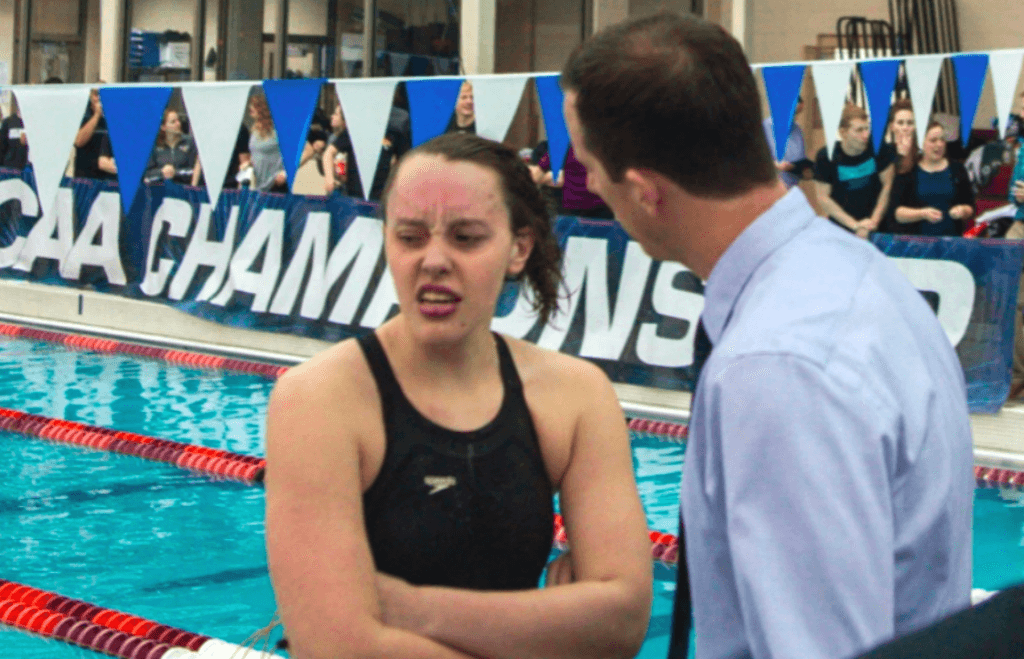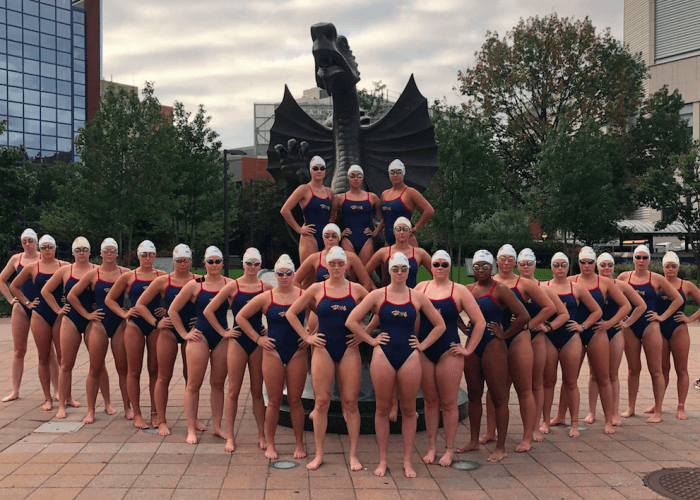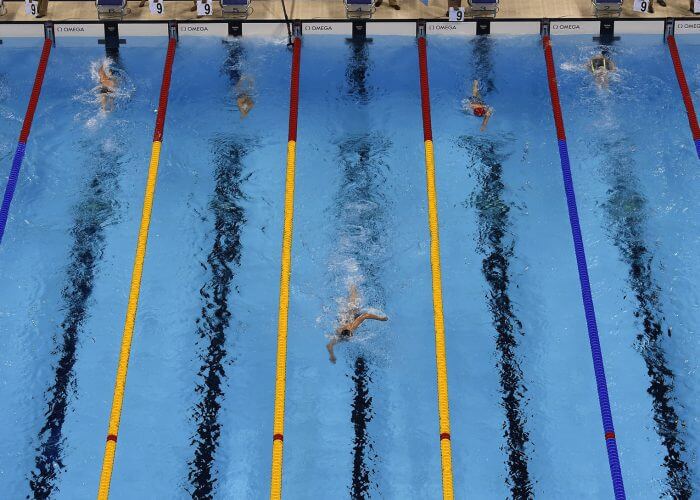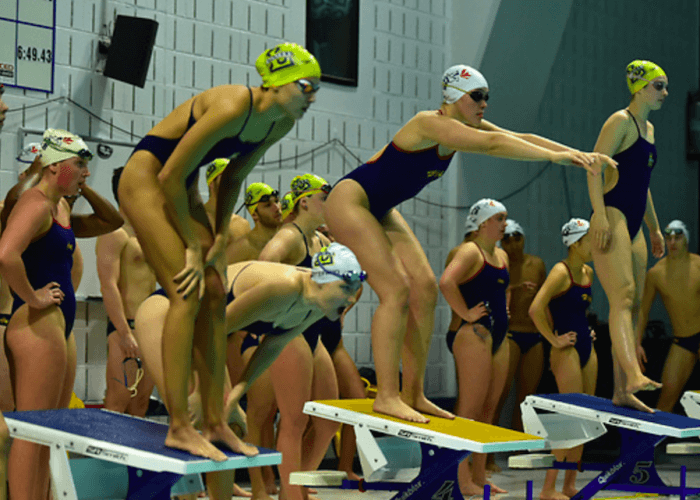Swimming for Dummies: Stop Asking us These 6 Questions

We’ve all been there. You strike up a conversation with someone and they ask what sport you play. Jokingly, you respond that you “play” swimming. Before you know it, you are bombarded with a number of well-intentioned questions and statements. It makes your head spin how much people don’t understand about the sport that is so near and dear to you. Swimming World looks to clarify (with a little sass) the most frequently asked questions non-swimmers have about the sport.
1. Is swimming an easy sport?

Drexel women showing off their athleticism. Photo Courtesy: Drexel Athletics
This can be one of the most infuriating statements a swimmer can hear. Swimming is not just a sport, but a demanding one. Without getting into the philosophical weeds, sport has been defined as “an athletic activity requiring skill or physical prowess.” Any swimmer knows that swimming embodies this definition and so much more. Non-swimmers truly do not understand how hard swimming is until they have experienced two to four hours a day of intense training nearly every day of the week.
2. Did you win the meet?

A podium win for Denison at NCAAs. Photo Courtesy: Denison Athletics communications
While swimmers compete on a team, this does not mean the sole focus of competition is the team score. Swimming is also a very individualized sport. Therefore, athletes can experience an individual win even when the whole team does not. In addition, the importance of team placement varies in terms of college/high school versus club. A more appropriate question would be, “Did you win your race?” or simply, “How did you finish?” The swimmer can then answer and elaborate on what event, what meet, etc.
3. Are you going to the Olympics? Probably means you know Michael Phelps.

Olympic Rings. Photo Courtesy: Pexels, pixabay
Not every swimmer you will encounter is going to the Olympics. It’s just a fact. The average person does not understand just how hard it is to make the Olympics for the U.S. That’s not to say it’s not a dream for every swimmer. All things considered, the dream of someday competing at the Olympics is instilled in many swimmers and carries them far. But just because we are swimmers does not mean we have Michael Phelps’ contact information, nor do we know him on a personal level. Not every basketball player knows Lebron James.
4. Why do you wear those big coats? Are they some sort of fashion statement?

Swim rivals proudly sport their parkas. Photo Courtesy: Megan Clark
The big coats are called swim parkas. They are just one accessory that help keep our muscles warm. With just a swim suit on, pool decks can get quite chilly, especially when getting out of the water. These big coats are thrown on between races for ultimate performance. Some swimmers will even go as far as to wear gloves, hats, scarfs, etc. Most just stick to shoes and socks, pants, and a sweatshirt of some sort. Coaches cannot stress enough how important this is for swimmers and their success.
5. What length do you swim?

University of Michigan pool in 25-yards format. Photo Courtesy: Dan D’Addona
First of all, we use the word “laps” rather than “lengths.” A single lap is when someone swims from one side to the other. Second of all, it’s pretty entertaining when non-swimmers ask, “What length you swim?” If you say you swam a 200 backstroke, some may think this means 200 laps. Therefore, you have to explain the entire event breakdown from a 25 and up. This gets even more complicated when you attempt to explain the difference between long course meters and short course yards. Hence, prepare for a lengthy discussion on the topic.
6. Are you good? I bet I could beat you.

Katie Ledecky’s dominant lead in the 800m freestyle in Rio. Photo Courtesy: USA TODAY Sports-USA TODAY Sports
Whether it’s a pool party or PE class, a non-swimmer is brave enough to ask how good you are. It’s always a challenge to answer this question. Good is a relative term: Good enough to beat a non-swimmer or good enough to compete with Katie Ledecky? The two elicit vastly different answers. It might help to mention hardware you’ve won or past meet results. If they know little to nothing about swimming, that’s when you skip the talking and declare a race to see just how good you are. Even with a head start, usually the swimmer reigns victorious and the other person stays quiet. Time for some humble pie? Don’t mess with a swimmer.
Other common questions:

Photo Courtesy: Sideline Photos
Why do you wear that cap on your head? It keeps the hair in and decreases drag, which leads to faster times.
What’s the deal with shaving? Swimmers go months without shaving to build up drag that is later shaved before big competitions to swim extra fast. Sorry not sorry for the fur.
How long can you hold your breath? Enough to keep us underwater for at least 15 meters. Most swimmers can hold their breath for at least 25 yards or more.
How much do you eat? A lot.
What time do you wake up? Too early (usually around 5 a.m., depending on the day).
Do you pee in the pool? The real question is: Who doesn’t?
-All commentaries are the opinion of the author and do not necessarily reflect the views of Swimming World Magazine nor its staff.




Rasha Youssef
When is your season over?
Swimmers do ot have a certain season. We swim in all kinds of weather. In the winter we swim indoors, so we don’t freeze, in the summer we can swim indoors or outdoors.
I met a collegiate runner who was allowed to hang out with football players but not with swimmers. All the pain tolerance must make for some tough men and women
Great job Alexa! ?
How did you do at your match/game?
Jon Pat Ransom, it’s kutch ?
No no…. Don’t pee in the pool. No. What are we, animals?!?
Walter panas
#6 I was challenged to a race across a lake 30 ago from a guy on our first date. 1/2 way across he swam to the bank, got out and walked back…I swam because I wasn’t going to walk in the weeds. lol. We’ve been married 28 years now. 🙂
For #6 in High School during the swimming unit I would get asked that and I would just tell them to look at the record board ?
Missing the lap part.